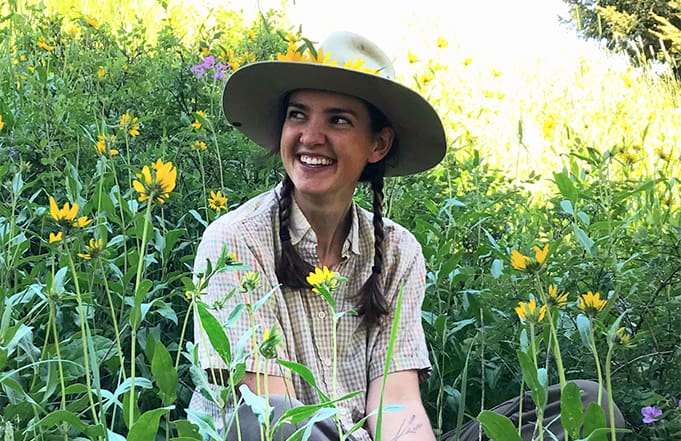April 30, 2020
Lydia Landau, a Montana Western graduate, grew up in Maryland and lived in several places before attending UMW, including California, Oregon and Montana. She graduated in Dec. 2019, majoring in Environmental Science with options in Sustainable Natural Resource Management and Wetland Management.

Landau was scheduled to present her report, titled “Impact of Mesic Restoration Structures on Soil Moisture in a High-Elevation Sagebrush Steppe Tributary in Southwest Montana,” at the National Conference on Undergraduate Research (NCUR) this spring.
After careful consideration regarding the coronavirus disease (COVID-19) pandemic, Montana State University canceled the 2020 NCUR in coordination with the Council on Undergraduate Research, that was scheduled for Mar. 26-28 in Bozeman, Mont.
Landau’s report was a multivariate statistical analysis of soil moisture data from a mesic restoration site in Little Basin, located in Southwest Montana. In an interview, Landau explained that mesic sites are areas that are wetter than surrounding upland sagebrush. They are important oases for arthropods, forbs, and the animals that eat them since they stay wetter later into the year than the surrounding landscape.
A multi-agency restoration project lead by the Nature Conservancy in Southwest Montana is currently using low-tech, inexpensive structures to slow the spread of intermittent flow of water in mesic, or potentially mesic, areas. Landau focused on analyzing the soil moisture to see if current mesic restoration efforts were having the anticipated effect of slowing the flow of water in mesic areas in a noticeable way. At this stage of her research, Landau was unable to detect a difference between the treatment and control sites, although similar projects in other states have taken up to five years to show changes, requiring further study and possibly changes to the experiment’s design.
At Montana Western, students take one course at a time, three hours each day for 18 days before moving onto the next, known as Experience One. Landau stated, “Experience One and the block scheduling system allows professors to prioritize field experience, which is so essential in environmental science.”
“Block scheduling allowed me to spend time in the field working on the periphery of this project before I was really personally involved. I was able to meet the people carrying out the project and get familiar enough to have an idea of where to begin when it came time for my own research. This experience has been incredibly professionally validating and also has me thinking more seriously about grad school,” said Landau.
Dr. Rebekah Levine, a geomorphologist and assistant professor at UMW, was involved in the restoration projects and introduced Landau to mesic sites in 2017 in a hydrology class, where they mapped out potential restoration sites. Landau said that Levine has been her advisor from the beginning and has also incorporated aspects of the project into other hydrology and surficial processes classes since then.
Dr. Eric Dyreson aided Landau in designing a statistical approach, playing an essential role in writing the Matlab code she used to carry out the analysis. She also had help from Kyle Cutting of the Red Rock Lakes National Wildlife Refuge and Thomas Sutton, a graduate student at Montana State University studying vegetation and arthropod response to mesic restoration at the same study site.
Landau shared, “the most rewarding part was getting to participate in the project with so many agencies, graduate students, and working professionals. It felt very validating to have my work taken seriously by people actually doing the work in the field.”
This summer, Landau plans to do BLM-style AIM vegetation and soil surveys in Idaho for the Montana Natural Heritage Program, and hopes to continue to find ways to work outside.
For more information about Experience One and the University of Montana Western, call 877-683-7331.